Bart & Fleming: Ben Bradlee V Harvey Levin; CAA, WME And Lew Wasserman
Peter Bart and Mike Fleming Jr. worked together for two decades at Daily Variety. In this occasional column, two old friends get together and grind their axes, mostly on the movie business.
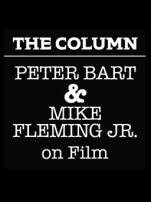
FLEMING
: I have this week been reading a lot of coverage on the death of Ben Bradlee, and he sure seemed to have the spine and the smarts that you’d expect from the guy who oversaw The Washington Post during the era of Watergate and the Pentagon Papers. The most fun premiere party I ever attended was HBO’s Grey Gardens, because the after-party brought us to the actual East Hampton Grey Gardens house restored by Bradlee and his wife Sally Quinn. Ben greeted everyone and told us in great detail how trashed the house was when they got it, and all the work that went into turning it into a classic summer residence. He was in his late 80s then, but if he had told me he’d done the sheet rock, electric, insulation and heating with his own hands and chased out all the raccoons and cats that nested in the walls when eccentrics Big and Little Edie Bouvier owned it, I’d have believed it. Actually, he did say he chased out some of those critters. He was that vibrant. Right after reading David Carr’s terrific NYT testimonial on Bradlee, I was romanticizing All The President’s Men and the one daily newspaper editor I worked for at New York Newsday, the late tough guy Don Forst (every time I brought a complaint from an angered story subject to Don and his guys, I was told “tell him to go fuck himself”). Then I watch this movie Nightcrawler, and my sentimentality took a donkey punch, even though Dan Gilroy has directed a pretty great movie.
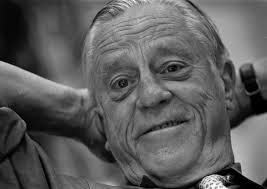
Jake Gyllenhaal plays this soulless go-getter who targets local TV news as his profession of choice. Armed with a cheap camcorder, fast car and a police radio, he sells footage of crimes, car crashes and murders (speeding through nighttime LA to get there before the cops) to a ratings challenged local LA TV station. He is so good at it that when he includes the romantic companionship of the station’s harried news director (Rene Russo) as a condition of the deal, she cannot refuse. I got annoyed at the notion this is how the public sees journalism and its practitioners, but the more I thought about it, why would they see it any different?
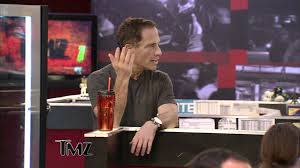
Look how TMZ: ended actor Stephen Collins’ career in a nanosecond, by airing an audiotape from a private therapy session in which he discussed pedophile indiscretions; forced Donald Sterling to sell the Clippers because his pillow talk with a mistress was so loathsomely racist his stars wouldn’t play for him; put the nail in Mel Gibson’s coffin for baring audio that made him sound like a raving lunatic in phone calls with the mother of his child. You can discount these breaks by saying this stuff may have gotten aired to settle scores, to set up a financial shakedown, or basic paycheck journalism, but Harvey Levin’s TMZ has broken more game-changing stories on the celeb front than anyone in recent years. Is he the next gen Ben Bradlee or just the face of the new incarnation of The National Enquirer, which once published pictures of cancer-ravaged Steve McQueen right after he died?
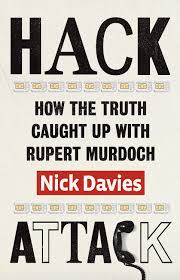
BART
: Media sleaze always uncorks the Fleming Furies – and this time I agree with you, Mike. The late Ben Bradlee, too, would have been outraged by the sleazy practices of Rupert Murdoch’s British newspapers as detailed in the new book, Hack Attack. Nick Davies, the author (and a reporter for The Guardian) details how Rupert’s top editors and reporters created a new genre of journalism: No one wasted time interviewing sources or checking facts. They simply hacked into everyone’s phones — everyone from cops to hookers to royalty. Happily, Davies book just got optioned by George Clooney, who sees many of the elements of the Watergate movie, All The President’s Men. Again we have the hapless reporter getting beat up by the power players but still coming up with his big story. In this case, the miscreants ended up on trial, some (too few) in jail. Rupert, of course, still maintains he knew nothing about the policies of his top reporters even though his son, James, authorized the multi-million dollar payoffs to keep some of the grisly details secret. It’s amazing to me that Rupert, a man who truly loves newspapers (there aren’t many like him left) would allow the credibility of his papers to be so badly compromised.
In acquiring rights to the Davies book, Clooney reportedly was surprised by the competitive bidding. Some of the prospective buyers (including at least one other big star) seemed motivated by sweet revenge (they’d been hacked). Others may have wanted to suppress the tome. A screen writer has yet to be assigned but Sony has picked up the project. Rupert’s power is pervasive and that includes possible allies on the Sony board. Hence it remains to be seen if Clooney’s film will get made the way he wants it to.
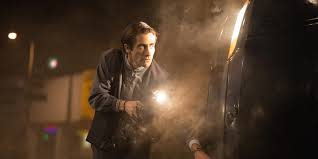
FLEMING
: It is amusing that those hacked lined up to turn the story into a film, but of course this vengeance only works if Clooney figures out a way to tell a compelling story, with people to root for. Or else it could be like another The Fifth Estate. Julian Assange was not an embraceable protagonist, and that doomed the movie. Nightcrawler, a work of fiction, is an exception; it somehow works because of Gyllenhaal’s anti-hero, the Hannibal Lecter of photo journalists.
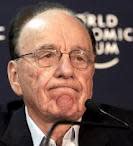
BART
: By the way, Mike, if Rupert is depicted as the ‘heavy’ in this movie, he won’t be the only representative of the news business to emerge as a bad guy on the screen next year. In Trumbo, an indie movie now shooting in New Orleans, Helen Mirren, cast as Hedda Hopper, is the ‘heavy’ relentlessly (and viciously) pursuing ‘Commie” screenwriters during the Black List Era. Dalton Trumbo, played by Bryan Cranston, is one of her victims. Hedda wielded enormous power as a gossip columnist in her era. I met her once or twice; she was no Rupert but she, too, was a nightmare adversary.
FLEMING: I forgot about Hedda, and Louella Parsons, and Walter Winchell, who grew so power mad he committed his own daughter to a mental institution. She was the only attendee at his funeral, as everybody who feared him for so long obviously hated him since they couldn’t be bothered to pay their respects. It seems what you suggest is these people have always been in our midst and maybe Bradlee is worth celebrating for holding a position of power so long and having more people swear by him than at him at the end. He didn’t seem to succumb to misplaced sense of ego that power can bring.
Next topic. I wrote Monday about TPG upping its stake in CAA from 35% to 53% for about $225 million in equity. What surprises me as CAA and WME continue to build themselves into global service businesses each valued in the billions, is how little traditional showbiz revenues from film and TV factor into the bottom line. It has been only eight years since CAA began building its sports division, one piece at a time. WME took the plunge with its acquisition of IMG. These agencies once were underwritten by TV revenues and first dollar grosses. Estimates are that in each agency, those businesses contribute 30% or less of the bottom line. Each is into investment banking and venture funds but the real growth area is sports because it’s so global; aside from servicing more than double the jocks of any agency, CAA has brokered over $3 billion in property sale deals for Madison Square Garden, Yankee Stadium and FC Barcelona. WME has NASCAR, NFL and Major League Soccer, as well as musical festivals like Lollapalooza, to name a few. No wonder an old style agency launch like Resolution failed; it seems film and TV would only support a boutique venture.
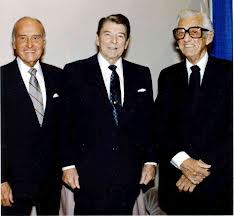
BART
: Your reflections on the mega agencies, Mike, led me to think back on the many conversations I had with Lew Wasserman, who in his time was the King of all Agents. I think Lew, if alive today, would be both pleased and pissed over the behavior of the dealmakers who are busily re-inventing the agency business. I used to have monthly lunches with Wasserman in his later years (after he sold control of MCA Universal to Matsushita). He carefully explained to me how he became frustrated by the limitations of agenting and decided to focus on running the entertainment business rather than repping it. In becoming a superbly successful CEO, he succeeded in doing what Michael Ovitz later failed at – switching from agent to Disney CEO.
FLEMING: Sounds like he would be right at home with the way these service companies have evolved.
BART: If Wasserman were around today, however, I think he’d be wary about the financial multi-tasking of the power players sitting atop today’s mega agencies. While still ostensibly repping talent, they are simultaneously managing vast companies with complex financial structures serving widely divergent industries. Are they inevitably becoming the employers of the talent they supposedly represent? Are they attempting to bridge too many disciplines and serve too many masters? Whenever I run into a top agent these days they often talk to me about their financial deal making and the businesses they personally run outside of their talent agencies – restaurants, galleries, branding companies. I respect their savvy, but are they still agents?
FLEMING: I think their guys in their trenches still live and die for the clients, but the places they work have outgrown that as the core business. If a strike happened today, CAA and WME would have plenty of cash flow. These guys had to change their outlooks to grow. Just as the lines between TV and film were erased and stars now do both, these agencies have erased the line between film/tv/music and sports. Now, whether you emote, sing, kick a ball or throw a spiral, you are all entertainers and the big money is not only in talent deals but everything else that being in those ballparks allow.
BART: Again, Wasserman would have appreciated all this but I always had the feeling that, most of all, he loved talent. He enjoyed spinning stories to me about the superstars he repped in his younger days, how he saved their careers when they got into trouble and orchestrated their divorces. He remained a talent agent in his heart of hearts, though many rivals said he had no heart at all. He was a tough guy in a tough business. So are those who have inherited, and expanded upon, his vision.
Related stories
Hot Red Band Trailer: 'Nightcrawler'
Ben Bradlee Dead At 93, Washington Post Editor During Watergate Era — Update
'Star Wars Episode VII' Lead Daisy Ridley Signs With CAA
Get more from Deadline.com: Follow us on Twitter, Facebook, Newsletter
